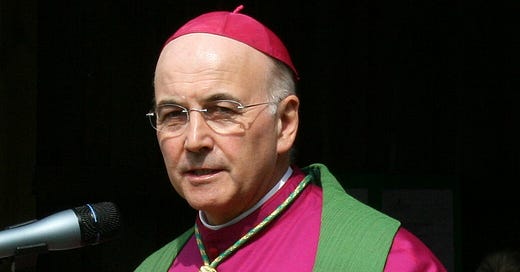
The Vatican has backed a German bishop’s decision to dissolve a Catholic lay group associated with the disputed Marian apparitions at Medjugorje.
The Dicastery for Laity, Family, and Life issued a decree on July 13 approving Bishop Felix Genn’s dissolution of “Totus Tuus New Evangelization,” the Diocese of Münster announced a day later.
Totus Tuus had appealed to the Vatican after Genn issued a decree suppressing the organization on Nov. 4, 2021, following a probe into the alleged spiritual mistreatment of its members.
According to the diocese in northwestern Germany, the dicastery ruled that the dissolution was appropriate because of the “harm” caused by the association, which had 135 members at the time of the decree. It added that the ban sought to prevent further harm.
The organization, formed in 1994, took its name from the motto of St. John Paul II, which meant “Totally Yours” and expressed his total consecration to Jesus through Mary according to the teaching of French saint Louis-Marie Grignion de Montfort.
German media said that the group offered confirmation courses, camps, and prayer meetings for young people. It also took hundreds of youngsters a year to Medjugorje, the site of alleged Marian apparitions in Bosnia and Herzegovina.
The Vatican has not issued a definitive judgment on the reported visions, but since 2017, it has sent a representative to oversee pastoral care at the site, which receives around a million visitors a year.
In his November 2021 decree, which did not refer to Medjugorje, Bishop Genn said that the group’s leadership was “not willing, ready and able, on the one hand, to see the serious deficiencies recognized in the spiritual treatment of members of this community and, on the other hand, also to remedy the serious shortcomings.”
He ruled that the group could no longer describe itself as a Catholic association and prohibited employees engaged in pastoral service in the Münster diocese from being involved with the group.
His decisions were preceded by a 2017-18 visitation and a “process of discussion and reappraisal” lasting almost two years and ending with a final report in November 2020.
The diocese said in November 2021 that “no evidence of criminal offenses or other legal misconduct was found.”
But it quoted Genn as saying: “Based on the visitation results and after in-depth consultation, I have come to the assessment: there were repeated actions and communication behaviors in the Totus Tuus community that we now include under the term spiritual abuse. The community has developed structures and behaviors that have enabled and encouraged such actions.”
The bishop added: “In the Diocese of Münster, there is also an attitude of zero tolerance in the case of spiritual abuse, which is understood to mean boundary-violating behavior in a pastoral context and spiritual abuse of power in ecclesial communities.”
Totus Tuus, which remained an association registered in civil law, asked Genn to withdraw the decree but he rejected the request.
The group’s website is now empty except for a message reading: “This website has been shut down due to the decree of the Bishop of Münster dated 11.04.21. It should be noted that as a result of the above decree, there are currently no statements from the Totus Tuus community.”
The Vatican has approved the suppression of several lay groups in recent years, including the Movimento Apostolico and Maria Madre della Redenzione in southern Italy in 2021. The two groups, inspired by the purported visionary Maria Marino, faced action after complaints about governance problems and divisions among members.
In June, Belgian Cardinal Jozef De Kesel dissolved the Word of Life Community, recognized as a private association of the faithful in 1986, following the discovery of “serious and systemic dysfunctions.”
Earlier this month, the French Bishop Jacques Habert announced the closure of the Mission Thérésienne in his Diocese of Bayeux-Lisieux. The association, officially recognized in 1992, was reportedly closed due to dysfunctional management.
Pope Francis has signaled his concern about the quality of leadership in Catholic groups.
In June 2021, the Vatican issued a decree imposing strict limits on terms of office in central governing bodies of international associations of the faithful.
In September of that year, the pope told the moderators of lay associations, ecclesial movements, and new communities to avoid the “lust for power” and “the trap of disloyalty.”
He said that leaders could fall into the trap “when we present ourselves to others as the sole interpreters of the charism, the sole heirs of our association or movement … or when, believing ourselves to be indispensable, we do all we can to hold posts for life.”











I don't know any of the particulars, but I am skeptical of anything that a German Bishop does, given their track record on Synodality and their desire to conform the Church to the culture.